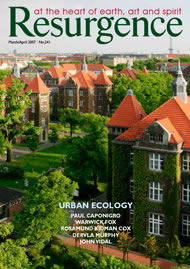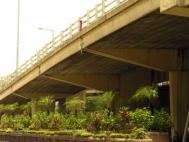The theme of this issue is urban renewal. Cities are supposed to be the centre of culture, whereas the countryside is seen as the preserve of nature. This is an artificial divide: there is no intrinsic conflict between nature and culture. Indeed, we should bring more nature into our cities. New urban planning is needed. We need small farms, gardens, orchards, ponds and allotments in our cities so that we can participate in the production of vegetables, fruits, milk, cheese and other foods. This will help to reduce food miles and we will enjoy healthy and fresh food in our cities. If people in Havana can have urban gardens and freshly picked sun-ripened fruit, then why can’t the same pleasure be afforded to the citizens of London, New York and New Delhi?
Every city needs to become a garden city. Whatever extra food is required should come from no more than a fifty-mile radius so that it is as local and fresh in the cities as possible. Fresh local food is an economic as well as an ecological imperative. Urbanism in the age of ecology needs a new vision; our urban planning needs a new paradigm: one that creates sustainable cities where living is a pleasure.
In addition to food, our cities also need to develop water harvesting and energy generation from the sun and the wind. Clouds deliver pure water to every rooftop free of charge, but instead of valuing this precious resource we treat it as an inconvenience, a waste, and pipe it away. Then we build reservoirs and dams, treat the water at great expense and then pipe it back to our homes. We pay a lot of money for our water, which is often subject to shortage. There is no reason why we cannot harvest rainwater to use for toilets, clothes washing and irrigating urban gardens. New urbanism should transform every rooftop into a water source.
Like water, there is an abundant supply of free wind and sunshine. Again we ignore these gifts of nature and go thousands of miles to get expensive energy such as coal and oil which cause a great deal of pollution and damage to the climate – not to mention geopolitical conflicts. Many who are worried about global warming are talking about moving from fossil fuel to nuclear fuel, which in my view is like falling from the frying-pan into the fire. We should ask them simple questions: Can you guarantee that one day, unlike coal and oil, the source of nuclear power, namely uranium, will not run out and that nuclear power will cause no side-effects such as nuclear bombs and nuclear waste? Can you guarantee that disastrous pollution and displacement of populations will not be caused while mining uranium?
As fossil fuel is causing global warming, nuclear power may cause global wars. George Monbiot has likened the distance between nuclear energy and a nuclear bomb to the distance between bread and a sandwich. Why do we take such a dangerous route to meet our energy needs?
On the other hand we can give a watertight guarantee that sun, wind and water will not run out, and if we use these wisely and frugally they will have no side-effects. When we can have safe, secure and abundant natural energy why opt for unsafe, insecure and scarce nuclear energy?
The challenge for new urbanism is to design our houses, our offices, our shopping centres and our streets in such a way that they become net producers of energy. With the combination of conservation, efficiency and decentralised methods of harvesting natural and renewable energy, we can certainly meet the challenge of sustainable cities. The only thing we need to do is to put our talent and investment into the creation of local food, local water and local energy, to make our cities worthy of human communities within the context of the Earth community.
SATISH KUMAR








